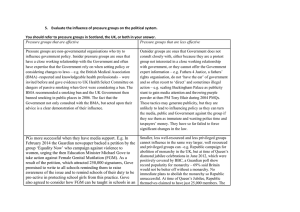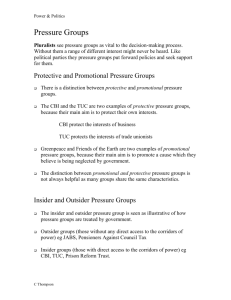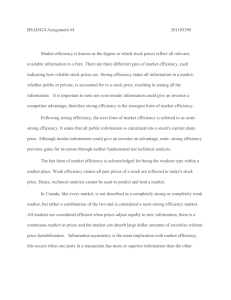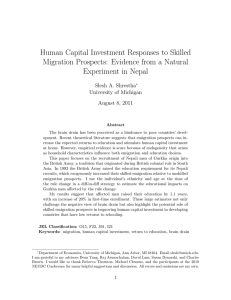Notes on pressure groups
advertisement
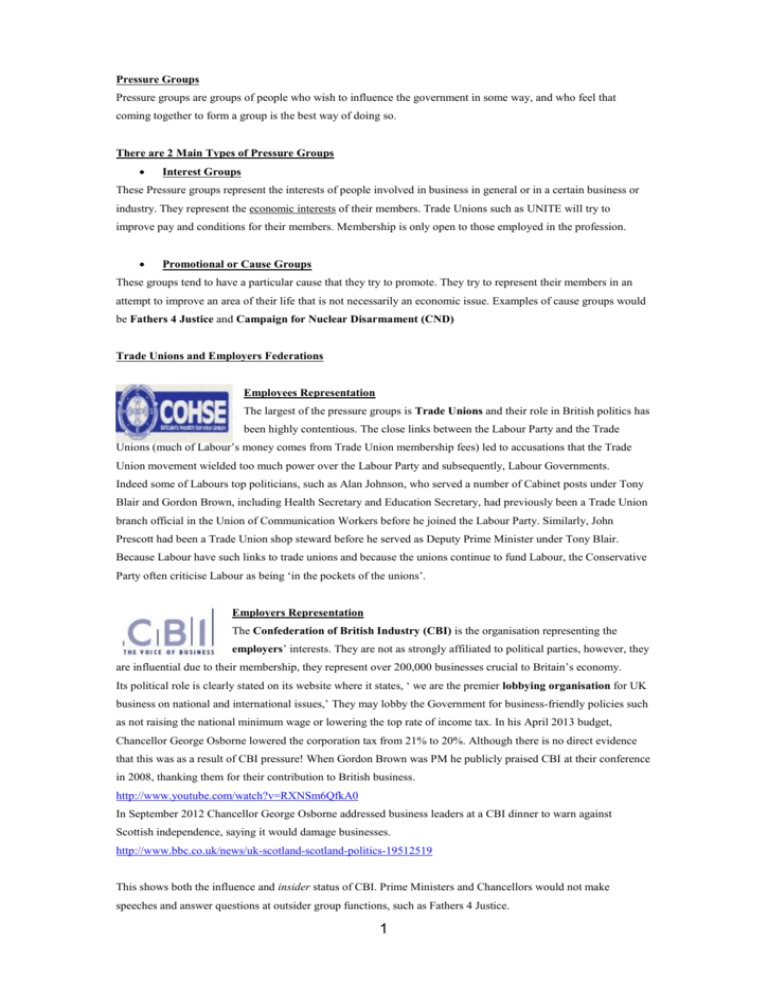
Pressure Groups Pressure groups are groups of people who wish to influence the government in some way, and who feel that coming together to form a group is the best way of doing so. There are 2 Main Types of Pressure Groups Interest Groups These Pressure groups represent the interests of people involved in business in general or in a certain business or industry. They represent the economic interests of their members. Trade Unions such as UNITE will try to improve pay and conditions for their members. Membership is only open to those employed in the profession. Promotional or Cause Groups These groups tend to have a particular cause that they try to promote. They try to represent their members in an attempt to improve an area of their life that is not necessarily an economic issue. Examples of cause groups would be Fathers 4 Justice and Campaign for Nuclear Disarmament (CND) Trade Unions and Employers Federations Employees Representation The largest of the pressure groups is Trade Unions and their role in British politics has been highly contentious. The close links between the Labour Party and the Trade Unions (much of Labour’s money comes from Trade Union membership fees) led to accusations that the Trade Union movement wielded too much power over the Labour Party and subsequently, Labour Governments. Indeed some of Labours top politicians, such as Alan Johnson, who served a number of Cabinet posts under Tony Blair and Gordon Brown, including Health Secretary and Education Secretary, had previously been a Trade Union branch official in the Union of Communication Workers before he joined the Labour Party. Similarly, John Prescott had been a Trade Union shop steward before he served as Deputy Prime Minister under Tony Blair. Because Labour have such links to trade unions and because the unions continue to fund Labour, the Conservative Party often criticise Labour as being ‘in the pockets of the unions’. Employers Representation The Confederation of British Industry (CBI) is the organisation representing the employers’ interests. They are not as strongly affiliated to political parties, however, they are influential due to their membership, they represent over 200,000 businesses crucial to Britain’s economy. Its political role is clearly stated on its website where it states, ‘ we are the premier lobbying organisation for UK business on national and international issues,’ They may lobby the Government for business-friendly policies such as not raising the national minimum wage or lowering the top rate of income tax. In his April 2013 budget, Chancellor George Osborne lowered the corporation tax from 21% to 20%. Although there is no direct evidence that this was as a result of CBI pressure! When Gordon Brown was PM he publicly praised CBI at their conference in 2008, thanking them for their contribution to British business. http://www.youtube.com/watch?v=RXNSm6QfkA0 In September 2012 Chancellor George Osborne addressed business leaders at a CBI dinner to warn against Scottish independence, saying it would damage businesses. http://www.bbc.co.uk/news/uk-scotland-scotland-politics-19512519 This shows both the influence and insider status of CBI. Prime Ministers and Chancellors would not make speeches and answer questions at outsider group functions, such as Fathers 4 Justice. 1 Pressure Groups Targets 1. Government: The Executive Branch – The Cabinet and Civil Service 2. The legislature – backbenchers; MPs can introduce Private Members’ bills. 3. Party Factions – different groups within political parties which may be sympathetic to your interests or cause 4. Public opinion and the media: The general public – their sympathy can exert a great deal of pressure on political parties and even governments. Why is this? By having good levels of subscriptions, a positive public image, good leaders and spokespeople and a sound organisation, the pressure group may promote its cause more favourably. An example of a pressure group which the public sympathetic to was the Gurkha Justice Campaign (GJC) fronted by Joanna Lumley, the popular, articulate and media savvy actress. Gurkhas are soldiers from Nepal who have been fighting for the British Army for almost 200 years. Until 2004 Gurkhas were not allowed to settle in the UK when they had retired from the British Army and they were sent back to Nepal, but the Labour Government changed the rules so that Gurkhas who retired after 1997 would be allowed to settle in the UK. Gurkha soldiers who had retired before 1997 were not allowed to settle in the UK. The Gurkha Justice Campaign has been campaigning for all Gurkha soldiers to be allowed to settle in the UK, regardless of when they retired. In 2008, the pressure group, led by actress Joanna Lumley (whose father had served in the Gurkhas) marched on Downing Street and presented a petition with 250,000 signatures demanding equal settlement rights for all Gurkhas. The Sun newspaper (read by between 4-8 million people every day0 supported the petition, saying ‘Let our Gurkha heroes stay’showing media support).In 2009, following a well publicised and highly successful campaign that drew positive media coverage and public sympathy, MPs passed a law allowing all Gurkhas to settle in the UK. However, at the same some Gurkhas had been told they had been denied residence in the UK, and Joanna Lumley confronted Immigration Minister Phil Woolas at the BBC Westminster studios and pressurised him into agreeing to further talks on the issue. http://www.youtube.com/watch?v=BcdeK27Y65s Following further consultation, with members of them Gurkha Justice Campaign invited to give evidence to a Home Affairs Select Committee, the Government announced that all Gurkhas who had served in the British Army for at least 4 years would be allowed residence in the UK. Following the announcement Joanna Lumley welcomed the Government’s announcement, saying: “After such a long fight, with huge ups and downs, this is a superb announcement. We simply would not have won this fight without the massive, overwhelming support of all those who have supported our campaign. To the hundreds of thousands of people who have signed Gurkha Justice petitions, lobbied their MP, campaigned, attended rallies and marches - thank you so much to you all. This is your victory. It would not have happened without you. The Government has now responded to that campaign after court cases, votes in Parliament, a huge media campaign and, most importantly, massive public support. I am delighted, and humbled, at what has been achieved by our remarkable team. The whole campaign has been based on the belief that those who have fought and been prepared to die for our country should have the the right to live in our country. We owe them a debt of honour - a debt that will now be paid.” This example is evidence that a pressure group with the backing of the media and the public can effectively pressure the Government into changing the law. 2 An example of a pressure group which the public does not have great sympathy with are Republic, who campaign for the abolition of the monarchy in the UK, and call for an elected head of state, saying that monarchy is not compatible with democracy. Republic has a number of high-profile supporters, including former MP and Cabinet Minister Tony Benn, 13 current MPs, 3 current Lords, comedian Jo Brand, former England footballer Stan Collymore, and film director Ken Loach. However, they are quite a small group, and at the time of the Queen’s Golden Jubilee in 2012, the group itself claims to have just 25,000 members. In addition, its cause is not one that is particularly popular with either the mainstream media or the public. A May 2012 Guardian Poll recorded record levels of popularity for the monarchy and 69% of respondents said they thought Britain would be worse off without the monarchy. Just 22% thought Britain would be better off without a monarchy. http://www.guardian.co.uk/uk/2012/may/24/queen-diamond-jubilee-record-support The Queen’s diamond jubilee in June 2012, marking 60 years of the Queen’s reign was widely celebrated in 2012 and covered positively by the BBC and there does not appear to be any immediate demands to abolish the monarchy, proving that pressure groups are less effective when they do not enjoy the support of the public. Republic do not receive much media attention. http://www.youtube.com/watch?v=YwgP272p4C0&feature=relmfu http://www.youtube.com/watch?v=PbOrlm8sSr0&feature=related Different Strategies The extent to which a pressure group can promote its interests depend largely on whether it is an insider group or an outsider group. Insider groups use more consultation, while outsider groups rely more on direct action to generate public opinion. Insider groups Insider groups are those which the Government thinks may help in the decision-making process and they will be asked for their expert knowledge, views and opinions, which often influence Government policy. Examples include trade unions (under Labour, not Conservatives), Confederation of British Industry (CBI), the Police Federation and the British Medical Association (BMA). We have already seen the influence of the CBI. The BMA closely consulted with the Government and gave expert evidence to the Health Select Committee on the dangers of passive smoking when they were considering a bill to ban smoking in enclosed public places. The Health Select Committee, influenced by the advice given by the BMA, reported to the Government that a ban was ‘the only effective means’ of protecting health. In 2006 (when Labour were in Government) MPs voted to ban smoking in enclosed public spaces in England. This shows that insider groups such as the BMA consult closely with Government and can affect policy. The Scottish Government had voted to introduce a smoking ban in enclosed public spaces in 2005. http://news.bbc.co.uk/1/hi/uk_politics/4709258.stm Pro-smoking pressure groups who do not work as closely with the Government were not happy with the legislation. Simon Clark, director of smoking support group Forest, said: "This is a double whammy and an unnecessary and illiberal piece of legislation that denies freedom of choice to millions of people.” Outsider groups Are those which are at odds with the Government’s views or deliberately reject insider status as they feel they would be constrained by working with Government. They often embark on direct action in an attempt to persuade the government to introduce legislation to help their cause. Examples of direct action are: Fuel Protests of September 2000 with lorries blocking roads 3 Campaign for Nuclear Disarmament’s (CND) anti-nuclear weapons demonstrations at Faslane Nuclear base in Scotland - former MSP Tommy Sheridan and current Respect Party MP George Galloway both staged sit-down protests and had to be forcibly removed by police. Anti Iraq War demonstration – in March 2005 approximately 45,000-100,000 people marched demonstrated in London, organised by Stop the War Coalition against the war in Iraq. Why are the figures so far apart? Members of Fathers 4 Justice, who campaign for fathers involved in divorce / custody battles to have greater access to their children. Members have previously scaled Buckingham Palace wearing Batman costumes and threw purple powder at then Prime Minister Tony Blair in the House of Commons from the public gallery during a PMQs session in 2004. http://www.youtube.com/watch?v=5XzMWL1Cgk4 Republic- see page 3 Consultation The government will often seek the views of larger pressure groups, particularly the larger interest groups, prior to making decisions. This gives interest groups such as Trade Unions and the CBI an opportunity to influence government decision making. Positives Pressure groups add to the representative and democratic elements in British politics due to a wider participation of diverse groups in the political process. Democracy is meant to be governance of the people by the people for the people and pressure Groups can help ensure representation for their specific interest group. They are an essential part of a healthy democracy as they allow participation in decision-making between elections. Negatives There is an argument that the bigger and wealthier the Pressure Group the more influential they are in shaping the Democratic process. With approximately 80% of the Footsie (Financial Times Stock Exchange FTSE) being members of the CBI you can imagine the power and influence they wield. However, the same could be argued for the Trade Union Movement! Not all pressure groups have the same opportunity to influence decisions. In a nutshell then, the basic raison d’etre for Pressure Groups can be condensed into three main categories as detailed below: Principal Objectives 1. Protecting specific economic interests 2. Promoting a specific cause 3. Influencing government 4 Pressure Group effectiveness In the 1960s and 1970s, the government met regularly with powerful economic pressure groups such as the trade unions. The Conservatives, under Margaret Thatcher, however, followed their own policies without much consultation, and the importance of these groups declined. New Labour adopted a more inclusive policy as far as Pressure Group consultation was concerned, although we are unlikely to return to the days of heavy influence of the 1960s and 70s. Those groups likely to have any influence with the government are insider groups, or groups which share the following characteristics: They represent powerful economic and professional interests. They are well-resourced, with sound leadership, administration and finances. They have been successful in attracting members, particularly middle class. They have a high level of expertise in their chosen field. They can mobilise public opinion in their favour through direct action. Arguments for the effectiveness of pressure groups They provide expert information and can guide policy development. They add to the process of open and effective government. They can ensure minority opinions are reflected. They provide opportunities for citizens to participate in the political process. Pressure groups are more likely to be effective when the Government does not have a large majority in Parliament. If the Government only have a small majority, then they are not guaranteed to be re-elected and neither are individual MPs, so they are perhaps more vulnerable to pressure group pressure Arguments against the effectiveness of pressure groups Insider groups can influence the Government before formal policies are known. Is this undemocratic? Well-resourced groups who represent the privileged have a big advantage. Many discussions between pressure groups (particularly insider groups) take place behind closed doors and are not open and transparent government. The policies of the elected Government may be compromised to suit the views of unelected members of fringe pressure groups. Pressure groups are less likely to effective when the Government has a large majority in Parliament. When they do, the Government may not feel particularly vulnerable to pressure group action or demands. . On the other hand, it is on occasions such as this where pressure groups become more important, as when opposition to the government is limited within Parliament, the focus of opposition extends to groups outside of Parliament, such as pressure groups. 5 Examples of pressure group essay questions: 2008: Assess the effectiveness of pressure groups in influencing decision-making in Central Government 2011: Some groups outside Parliament have more influence on decision making in Central Government than others. Discuss. (here you could mention pressure groups, the media, and senior civil servants). 2008: Structure: Brief mention of the ways pressure groups campaign (protests, demonstrations, use of media, lobbying, petitions, e-petitions, letter writing, direct action, sponsorship of political candidates etc.) Then 3 paragraphs on pressure groups that are effective, 3 on pressure groups being less effective: Pressure groups that are effective 1.Insider groups – e.g. BMA (respected and knowledgeable health professionals) evidence to Health Select Committee on dangers of passive smoking before smoking ban passed. Have also given evidence ahead of the 2011 Health and Social Care Act 2012, which makes some reforms to the NHS. Pressure groups that are less effective 1.Outsider groups – e.g. Fathers 4 Justice, do not ‘have the ear’ of government and so often resort to ‘direct’ and sometimes illegal action – e.g. scaling Buckingham Palace as publicity stunt to gain media attention and throwing purple powder at Blair during 2004 PMQs. Can turn the media and public against the group as they see them as immature and wasting police time, which wastes taxpayers’ money. Also Forest, pro-smoking group, not as widely respected as BMA, did not get their way in smoking ban debate. Trade Unions (under Labour), not Conservatives, e.g. successfully lobbied for introduction of National Minimum Wage, introduced in 1998 under Labour. CND? Members at demonstration forcibly removed by police – Galloway and Sheridan. Britian still has Trident nuclear weapons in Faslane, Scotland. 2.Don’t have media / public sympathy; e.g. Animal Liberation Front (ALF) who are opposed to animal cruelty, fur-wearing and laboratory testing of animals, but their methods were often illegal, such as torching cars of scientists known to be involved in lab testing and they were the subject of a critical Dispatches documentary – this turns the public and media off and make them less successful AlsoRepublic campaign for abolition of monarchy in the UK. 2.Have media / public sympathy: Gurkha Justice Campaign, led by media savvy, articulate and popular actress Joanna Lumley. Sun support and petition signed by a quarter of a million people, successfully managed to get law changed to allow all Gurkhas who have served at least 4 years in the British Army to have permanent residence in the UK, and not have to be sent back to Nepal. 3.Large, well-resourced, well-organised and privileged groups – e.g. CBI (insider) represents over 200,000 UK businesses. Brown publicly praised them in 2008 and Osborne addressed them in 2012. They campaign for lower business taxes and Osborne’s April 2012 budget lowered top rate of income tax from 50% to 45%, perhaps as a result of CBI influence. 3.Smaller, less well-resourced and less privileged groups –e.g. Republic campaign for abolition of monarchy in the UK, but at time of Queen’s diamond jubilee celebrations in June 2012, which were positively covered by BBC, Guardian poll show record popularity for monarchy – 69% said Britain would not be better off without a monarchy. No immediate plans to abolish the monarchy so Republic unsuccessful. At time of Queen’s Jubilee, Republic themselves claimed to have just 25,000 members (compare to Gurkha petition signed by 10 times that number) 6
